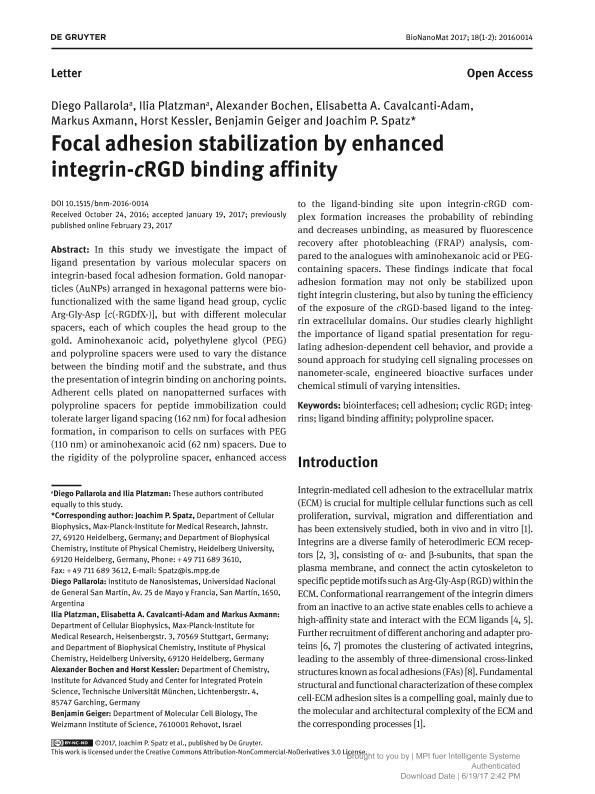Artículo
Focal adhesion stabilization by enhanced integrin-cRGD binding affinity
Pallarola, Diego Andres ; Platzman, Ilia; Bochen, Alexander; Cavalcanti Adam, Elisabetta A.; Axmann, Markus; Kessler, Horst; Geiger, Benjamin; Spatz, Joachim P.
; Platzman, Ilia; Bochen, Alexander; Cavalcanti Adam, Elisabetta A.; Axmann, Markus; Kessler, Horst; Geiger, Benjamin; Spatz, Joachim P.
 ; Platzman, Ilia; Bochen, Alexander; Cavalcanti Adam, Elisabetta A.; Axmann, Markus; Kessler, Horst; Geiger, Benjamin; Spatz, Joachim P.
; Platzman, Ilia; Bochen, Alexander; Cavalcanti Adam, Elisabetta A.; Axmann, Markus; Kessler, Horst; Geiger, Benjamin; Spatz, Joachim P.
Fecha de publicación:
01/2017
Editorial:
De Gruyter
Revista:
BioNanoMaterials
ISSN:
2193-0651
e-ISSN:
2193-066X
Idioma:
Inglés
Tipo de recurso:
Artículo publicado
Clasificación temática:
Resumen
In this study we investigate the impact of ligand presentation by various molecular spacers on integrin-based focal adhesion formation. Gold nanoparticles (AuNPs) arranged in hexagonal patterns were biofunctionalized with the same ligand head group, cyclic Arg-Gly-Asp [c(-RGDfX-)], but with different molecular spacers, each of which couples the head group to the gold. Aminohexanoic acid, polyethylene glycol (PEG) and polyproline spacers were used to vary the distance between the binding motif and the substrate, and thus the presentation of integrin binding on anchoring points. Adherent cells plated on nanopatterned surfaces with polyproline spacers for peptide immobilization could tolerate larger ligand spacing (162 nm) for focal adhesion formation, in comparison to cells on surfaces with PEG (110 nm) or aminohexanoic acid (62 nm) spacers. Due to the rigidity of the polyproline spacer, enhanced access to the ligand-binding site upon integrin-cRGD complex formation increases the probability of rebinding and decreases unbinding, as measured by fluorescence recovery after photobleaching (FRAP) analysis, compared to the analogues with aminohexanoic acid or PEGcontaining spacers. These findings indicate that focaladhesion formation may not only be stabilized upon tight integrin clustering, but also by tuning the efficiencyof the exposure of the cRGD-based ligand to the integrin extracellular domains. Our studies clearly highlightthe importance of ligand spatial presentation for regulating adhesion-dependent cell behavior, and provide asound approach for studying cell signaling processes on nanometer-scale, engineered bioactive surfaces underchemical stimuli of varying intensities.
Archivos asociados
Licencia
Identificadores
Colecciones
Articulos(SEDE CENTRAL)
Articulos de SEDE CENTRAL
Articulos de SEDE CENTRAL
Citación
Pallarola, Diego Andres; Platzman, Ilia; Bochen, Alexander; Cavalcanti Adam, Elisabetta A.; Axmann, Markus; et al.; Focal adhesion stabilization by enhanced integrin-cRGD binding affinity; De Gruyter; BioNanoMaterials; 18; 1-2; 1-2017; 1-13; 20160014
Compartir
Altmétricas



